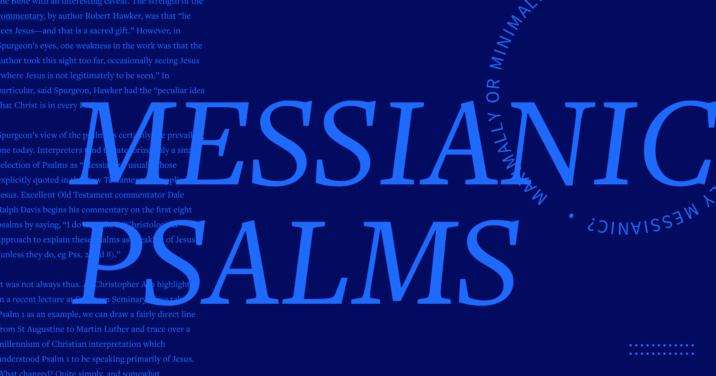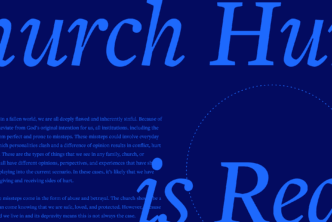Charles Spurgeon once recommended a commentary on the Bible with an interesting caveat. The strength of the commentary, by author Robert Hawker, was that “he sees Jesus—and that is a sacred gift.” However, in Spurgeon’s eyes, one weakness in the work was that the author took this sight too far, occasionally seeing Jesus “where Jesus is not legitimately to be seen.” In particular, said Spurgeon, Hawker had the “peculiar idea that Christ is in every Psalm.”
Spurgeon’s view of the psalms is certainly the prevailing one today. Interpreters tend to categorize only a small selection of psalms as “Messianic,” usually those explicitly quoted in the New Testament and applied to Jesus. Excellent Old Testament commentator Dale Ralph Davis begins his commentary on the first eight psalms by saying,
I do not take a “Christological” approach to explain these Psalms as speaking of Jesus (unless they do, eg Pss. 2 and 8).
It was not always thus. As Christopher Ash highlighted in a recent lecture at Southern Seminary, if we take Psalm 1 as an example, we can draw a fairly direct line from St. Augustine to Martin Luther and trace over a millennium of Christian interpretation which understood Psalm 1 to be speaking primarily of Jesus.
What changed? Quite simply, and somewhat surprisingly, John Calvin came along. Calvin followed the German Reformer Martin Bucer as well as medieval Jewish exegetes in wanting to root the interpretation of the psalms in their historical context. This was a good thing. Yet he did this to the extent that Jesus was almost squeezed out of the psalter. Calvin even sees Psalm 8, which any evangelical commentator today would regard as Messianic, as quoted in the New Testament “in a sense different from the original one.”
If seeing Christ in the Messianic psalms had become a struggle, it was not likely he would be seen elsewhere. Yet in our own day, the view of Augustine and Luther is experiencing a quiet resurgence. Why?
Psalm 1 and the righteous
To return to Psalm 1, James Bejon—a researcher at Tyndale House in the UK—has noted that “the righteous” is typically singular, whereas “the wicked” are invariably plural, and this directs our minds towards the one truly righteous man set forth in the Gospels. This is significant, because the first two psalms are widely recognized as the gateway to the Psalter, with implications for all that follows.
A related point is the authorship of the psalms. Half of them are attributed to David in their titles, and New Testament authors credit him with even more. Other psalmists, such as Asaph, did their work under David’s direction (1 Chron 25:1–2). As such, the psalms should be read not as the productions of pious individuals, but as coming from the pen of God’s anointed king (his “Messiah” or “Christ”)—with whom God had made an everlasting covenant (2 Sam 7). David, therefore, is the representative of the nation. As Ed Clowney put it in a series of 1973 lectures that were transformative for a young Tim Keller: “the psalms are not just the psalms of Mr. Everyman in Israel” but are “representative poetry,” written by the Lord’s anointed.
Indeed, this connection helps make sense of the sometimes violent imprecations in the psalms. David was speaking from his position as head of the nation; he wasn’t “a person with an imbalanced personality who sees all people who disagree with him as his ‘enemies’” (Palmer Robertson).
The psalms were sung in light of the hope that the true Son of David would one day come and sit on the throne of Israel, and thus Brevard Childs observes that
Israel continued to celebrate the righteous rule of its king long after the institution of kingship had been destroyed, because the earthly king from the line of David had become a type of God’s Messiah.
Indeed, Michael LeFebvre has persuasively argued that the Psalter was put together in its current format—when the Davidic throne had long been empty—in preparation for New Testament worship. New Testament quotations from Psalms are not intended to set limits as to which are Messianic; rather, they’re to demonstrate how we should interpret the rest.
One obvious objection to the argument here presented is the existence of psalms in which the writer confesses sin. Surely we can’t place those words on the lips of the sinless Son of God? John the Baptist voiced a similar concern when Jesus asked to undergo his “baptism of repentance.” Yet as our representative, it was “fitting” (Matt 3:15) that Jesus both stand and sing in our place.
The Psalms and the cross
The best way to begin to read the psalms in a more Christological way is to think what they would have meant to Jesus as he sang them enroute to the cross. Try it with Psalm 3—written by the Messianic king, betrayed and surrounded. Read (or better, sing!) verse 5, as many down the ages have done, speaking of the death and resurrection of that Messianic king. Perhaps you’ll be led to say, as one pastor did recently, “I read Psalm 3 today as if spoken by Jesus at the cross, and I doubt I’ll ever see it the same way again.”
For further reading
What You Might Be Missing about “Blessed Is the Man” in Psalms
Why Are There Lament Psalms at the End of the Psalter?
Pray the Psalms with Your Church
How the Dead Sea Scrolls Change Our Translation of the Book of Psalms
Recommended resources
Biblical Theology of the Old and New Testaments: Theological Reflection on the Christian Bible
Regular price: $29.99
Sing a New Song: Recovering Psalm Singing for the Twenty-First Century
Regular price: $14.99








